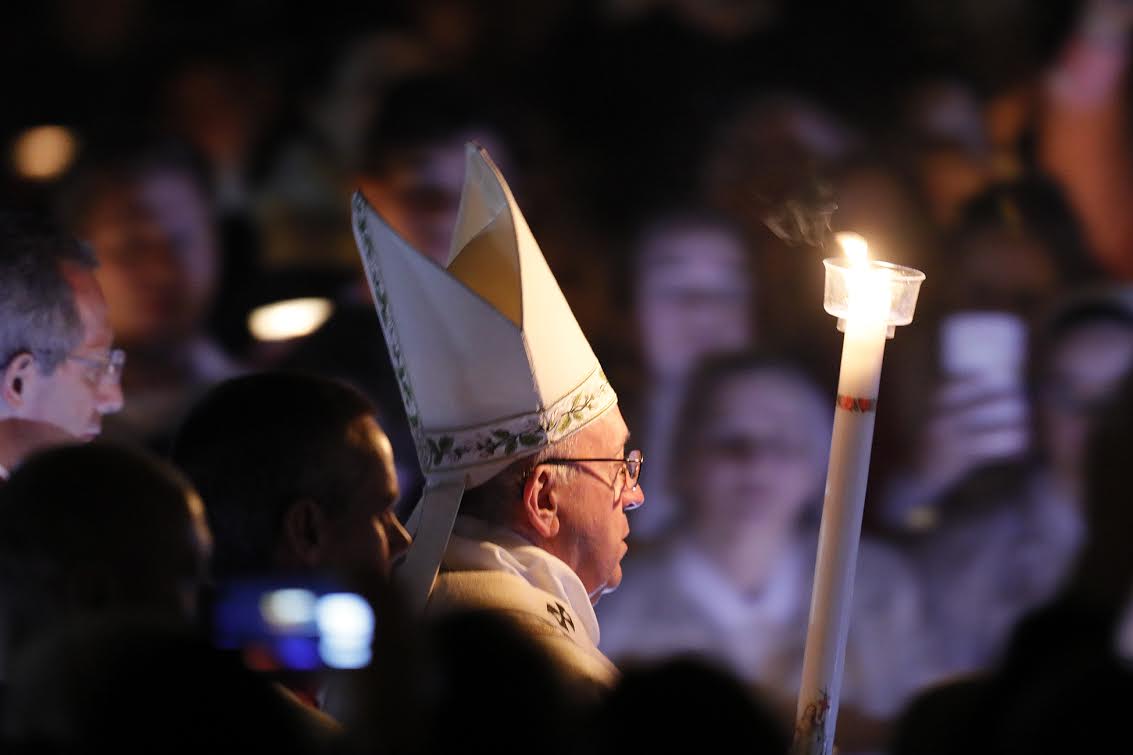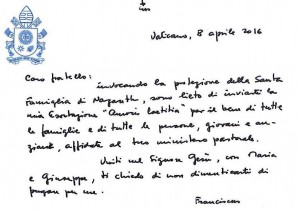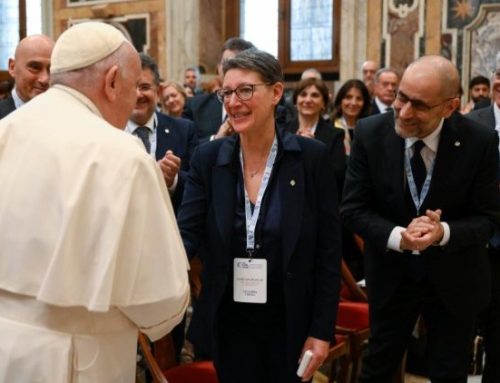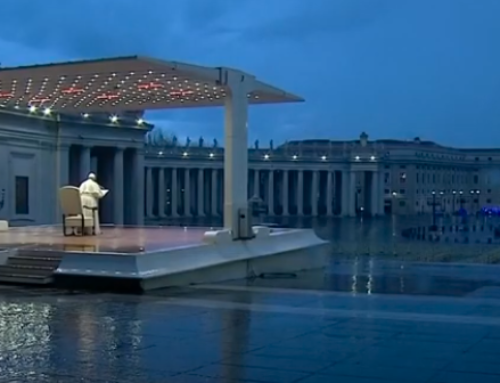You can read the document for yourself here.
But reaction and analysis is trickling in. For starters, on Aleteia’s homepage, Deacon William Ditewig weighs in with an analysis of the exhortation and finds some parallels between Pope Francis and one of his predecessors:
“Time is Greater than Space”
Pope Francis uses this expression twice in the Exhortation, first in AL 3 and then in AL 261, where he explains, “In other words, it is more important to start processes than to dominate spaces.” Back in AL 3, he writes,
Since “time is greater than space,” I would make it clear that not all discussions of doctrinal, moral or pastoral issues need to be settled by interventions of the magisterium. Unity of teaching and practice is certainly necessary in the Church, but this does not preclude various ways of interpreting some aspects of that teaching or drawing certain consequences from it. This will always be the case as the Spirit guides us towards the entire truth (cf. Jn 16:13), until he leads us fully into the mystery of Christ and enables us to see all things as he does.
In short, we hear an echo of St. John XXIII, who famously stated in his opening address to the bishops of the Second Vatican Council:
What is needed is that this certain and unchangeable doctrine, to which loyal submission is due, be investigated and presented in the way demanded by our times. For the deposit of faith, the truths contained in our venerable doctrine, are one thing; the fashion in which they are expressed, but with the same meaning and the same judgement, is another thing. This way of speaking will require a great deal of work and, it may be, much patience. . . . (John XXIII, Address Opening the Second Council of the Vatican, 11 October 1962)
This is a recurring theme in the Exhortation. The teaching of the Church on marriage and family is a constant, but the ways in which that teaching is expressed and lived in practical, pastoral ways is another. Just as St. John declared, Francis agrees that such an approach will demand a lot of work and much patience! A substantial portion of the Exhortation presents and affirms the Church’s teaching on marriage and family, grounded in Scripture and Tradition. It is a beautiful and often poetic presentation, building on a variety of sources. However, the pope also states, “We also need to be humble and realistic, acknowledging that at times the way we present our Christian beliefs and treat other people has helped contribute to today’s problematic situation. We need a healthy dose of self-criticism. . . . We have long thought that simply be stressing doctrinal, bioethical and moral issues, without encouraging openness to grace, we were providing sufficient support to families.”
He continues:
We find it difficult to present marriage more as a dynamic path to personal development and fulfillment than as a lifelong burden. We also find it hard to make room for the consciences of the faithful, who very often respond as best they can to the Gospel amid their limitations, and are capable of carrying out their own discernment in complex situations. We have been called to form consciences, not to replace them. (AL 36-37)
This emphasis on the role of conscience recurs several times within the document, and the pope offers an extensive presentation on the formation of conscience along with long established conditions of mitigation which might permit a variety of pastoral judgments.
There is much to break open in the text—it’s very long—but Ditewig concludes:
This is a document of balance, pastoral insight and, not surprisingly, mercy.
Elsewhere, America’s James Martin has 10 takeaways of the document that he calls “groundbreaking,” including:
All members of the family need to be encouraged to live good Christian lives. Much of “Amoris Laetitia” consists of reflections on the Gospels and church teaching on love, the family and children. But it also includes a great deal of practical advice from the pope, sometimes gleaned from exhortations and homilies regarding the family. Pope Francis reminds married couples that a good marriage is a “dynamic process” and that each side has to put up with imperfections. “Love does not have to be perfect for us to value it” (122, 113). The pope, speaking as a pastor, encourages not only married couples, but also engaged couples, expectant mothers, adoptive parents, widows, as well as aunts, uncles and grandparents. He is especially attentive that no one feels unimportant or excluded from God’s love.
We should no longer talk about people “living in sin.” In a sentence that reflects a new approach, the pope says clearly, “It can no longer simply be said that all those living in any ‘irregular situation’ are living in a state of mortal sin” (301). Other people in “irregular situations,” or non-traditional families, like single mothers, need to be offered “understanding, comfort and acceptance” (49). When it comes to these people, indeed everyone, the church need to stop applying moral laws, as if they were, in the pope’s vivid phrase, “stones to throw at a person’s life” (305).
And Robert Royal of the Faith & Reason Institute praises some of the document and its affirmation of Catholic teaching, but also writes:
Amoris Laetitia hopes to resolve the situations of many in the modern world, but is far more likely only to add further fuel to the holocaust. It doesn’t take a crystal ball to predict that once Communion can be taken by the divorced/remarried in some circumstances, it will soon be assumed licit by all. And – why not? – by people in gay relationships, who probably have an equally good claim to mitigating circumstances.
The pope spends many pages explaining how culpability and circumstances may qualify absolute moral principles without compromising the fullness of truth. (No thoughtful person has ever denied this, of course.) He even quotes Aquinas in this context – who is not exactly a poster boy for the kind of “pastoral” change the pope is suggesting. Expect protests from the Thomists.
His conclusion:
For all his claims to the contrary in these many pages, Francis seems more interested in bringing people comfort than full conversion to what Christ clearly taught on marriage.
The New York Times story on the exhortation quotes the editor of First Things, among others:
Conservative Catholics, who have already expressed concern that Francis could destabilize the church and undermine doctrine, were far less impressed. R. R. Reno, a Catholic theologian and editor of First Things, a conservative journal of religion and public life, lamented what he called a “muddy” document that substitutes the church’s “rules and laws and requirements” with “talk about ideals and values.”
“I think it’s an ill-judged shift,” Mr. Reno said. “This document clearly opens up the possibility that a priest may determine that a divorced and remarried person is worthy to receive communion, but under what terms and why is muddy.”
…The document “does not inspire joy in L.G.B.T. Catholics and their supporters,” said Francis DeBernardo, the executive director of New Ways Ministry, an advocacy group for gay Catholics.
“While not expecting a blessing on marriage for lesbian and gay couples, many were anticipating that Pope Francis would offer an affirming message to L.G.B.T. people, and not the same ill-informed comments,” said Mr. DeBernardo, who is based in Maryland. “Where is the Pope Francis who embraced his gay former student and husband during his U.S. visit? Where is the Pope Francis who invited a transgender Spanish man for a personal meeting at the Vatican? This Pope Francis is hard to find in his latest text.
Meantime, Bishop Daniel Thomas of Toledo has released a statement on the document:
As the title of this exhortation suggests, Pope Francis believes the Catholic Church can do more to assist families in rediscovering joy and hope in family life. The Holy Father encourages us not to allow fragile, complex or irregular situations to steal the joy that perseverance in faithful, generous and life-giving love brings to the world in a powerful way.
Amoris Laetitia signals no change in Church teaching on sensitive and controversial matters, such as divorced and remarried Catholics and same-sex unions. Pope Francis calls all in the Church to a culture of encounter and accompaniment. The Holy Father desires all of us to rediscover the beauty of living the teachings of Jesus that show us the path to true love and true joy. He calls us neither to condemn nor condone, but instead to meet people where they are, no matter the situation, and draw them into the transforming love of Christ. This document is all the more significant when read through the lens of this Jubilee Year of Mercy, a year which proclaims not anything goes, but anything forgiven.
I hope and pray that anyone who feels estranged or confused by the Church’s teaching will seek the care and assistance of our local pastors, and encounter the mercy and healing of Jesus.
In the introduction to his exhortation, Pope Francis encourages us to read Amoris Laetitia patiently and carefully in order to avoid a “rushed reading of the text” (AL #7). We look forward to the fruit that the study of this document will bring to the lives of the families of our Diocese.
Bishop Kevin Farrell of Dallas writes on his blog:
As this is a pastoral document, the Pope neither proposes or anticipates changes in the Church’s traditional teaching, yet points out that “When faced with difficult situations and wounded families, it is always necessary to recall this general principle: ‘Pastors must know that, for the sake of truth, they are obliged to exercise careful discernment of situations’ (Familiaris Consortio, 84). The degree of responsibility is not equal in all cases and factors may exist which limit the ability to make a decision. While clearly stating the Church’s teaching, pastors are to avoid judgements that do not take into account the complexity of various situations.”(AL, 79)
There are those who will be disappointed with this document; some who feel it does not go far enough in addressing the hopes of those in irregular marriages, others who feel it compromises traditional teaching. In my opinion, it reflects the call of Jesus to his church to continue his healing and saving mission.
And finally, there’s this from Elizabeth Scalia:
What struck me about Amoris Laetitia, is how clearly it demonstrates the consistency of Francis’ thinking, and what he seems to have embraced within his Petrine mission. There are really no surprises in this document — and no change in doctrine, because this is more about how we find the pastoral way to the doctrine — but there is clear evidence that certain themes run deep within the Holy Father’s spiritual understanding, and they are of-a-piece with a world-view that is founded not on a continual quest for “progress” but instead leads us back to what is instinctive to our humanity. Back to the garden, as it were; to what is natural.
……………………………….
JHS
Vaticano 8 aprile 2016
Caro fratello:
invocando la protezione della Santa Famiglia di Nazareth, sono lieto di inviarti la mia Esortazione “Amoris laetitia” per il bene di tutte le famiglie e di tutte le persone, giovani e anziane, affidate al tuo ministero pastorale.
Uniti nel Signore Gesù, con Maria e Giuseppe, ti chiedo di non dimenticarti di pregare per me.
Franciscus
§ § § § § § § §
+
JHSThe Vatican, 8 April 2016
Dear brother:
Invoking the care of the Holy Family of Nazareth, I am happy to send you my exhortation “Amoris laetitia” for the good of all the families and persons, young and old, entrusted to your pastoral ministry.
United in the Lord Jesus, with Mary and Joseph, please do not forget to pray for me.
Franciscus
§ § § § § § § §
+
JHSCité du Vatican, le 8 avril 2016
Cher frère,
Invoquant la protection de la Sainte Famille de Nazareth, je suis heureux de t’envoyer mon Exhortation «Amoris laetitia» pour le bien de toutes les familles et de toutes les personnes, jeunes et âgées, confiées à ton ministère pastoral.
Unis dans le Seigneur Jésus, avec Marie et Joseph, je te demande de ne pas oublier de prier pour moi.
Franciscus
§ § § § § § § §
+
JHSVatikan, 8. April 2016
Lieber Mitbruder,
unter Anrufung der Heiligen Familie von Nazareth darf ich Ihnen voller Freude meine Exhortation „Amoris laetitia“ zusenden, zum Wohl aller Familien und aller Menschen, jung wie alt, die Ihrem Hirtendienst anvertraut sind.
Vereint in Jesus unserem Herrn, mit Maria und Josef, bitte ich Sie, nicht zu vergessen, für mich zu beten.
Franciscus
§ § § § § § § §
+
JHSVaticano 8 abril 2016
Querido hermano:
Invocando la protección de la Sagrada Familia de Nazaret, me complazco de enviarle mi Exhortación “Amoris laetitia” por el bien de todas las familias y de todas las personas, jóvenes y ancianas, confiadas a su ministerio pastoral.
Unidos en el Señor Jesús, con María y José, le pido que no se olvide de rezar por mí.
Franciscus
§ § § § § § § §
+
JHSVaticano, 8 de abril de 2016
Caro irmão,
invocando a proteção da Sagrada Família de Nazaré, tenho a alegria de te enviar a minha Exortação “Amoris laetitia” para o bem de todas as famílias e de todas as pessoas, jovens e idosas, confiadas ao teu ministério pastoral.
Unidos no Senhor Jesus, com Maria e José, peço-te que não te esqueças de rezar por mim.
Franciscus
……………………………
After nearly 18 months of speculation, the other shoe has dropped, and Pope Francis has finally issued his apostolic exhortation on the 2014-15 Synod of the Family. In true Francis fashion he has issued a document that he hopes will challenge everyone (para. 7). Against calls for “general rules” or “immoderate … change,” he instead articulates a philosophy of accompaniment, which depends not on rules but on relationships (para. 2). In particular he urges us to cherish the good in every family situation, no matter how irregular (paras. 77, 292).
Apart from sparking an inevitable firestorm of controversy around hot-button issues, Amoris Laetitia (The Joy of Love) also directs stirringly beautiful words of encouragement and inspiration to married couples in line with the teaching of Pope St. John Paul II. Commentators have long wondered and worried if the thoughts of John Paul II would be reflected in this newest Church pronouncement on the family. The reading guide for bishops, presented earlier this week, reassured clerics that Amoris Laetitia was heavily inspired by the Theology of the Body, the former pontiff’s groundbreaking discourses on marriage and sexuality.
Amoris Laetitia combines brilliant scriptural analysis akin to John Paul II’s with a healthy dash of Francis’ plain-spoken, homespun wisdom. Its praise of sexual and erotic love echoes Pope Benedict XVI in Deus Caritas Est (God is Love). Pope Francis’ chapter 1 on the biblical basis of marriage tracks the journey of Adam and Eve from solitude to togetherness, and then to suffering and finally redemption through Jesus Christ (paras. 9-22), just as John Paul II did in the opening addresses of the Theology of the Body.
The two “central chapters” of Amoris Laetitia, and the ones in which Pope Francis speaks most directly to married couples, are chapters 4 and 5 (paras. 6-7). Chapter 4 leads us line by line through St. Paul’s much-beloved Hymn to Love in 1 Corinthians 13, while chapter 5 focuses on the fruitful love that is “a symbol of God’s inner life” (para. 11). These chapters offer the following strikingly practical insights on how to live the married vocation to the fullest.
See each other (para. 128). “We often hear in families: ‘My husband does not look at me,’” or “‘My wife no longer looks at me; she only has eyes for our children,’” notes Pope Francis. Husbands and wives must not withhold a “look of appreciation,” a gaze of “contemplative love,” even when our spouse has become “infirm, elderly or physically unattractive,” he continues. “Much hurt and many problems result when we stop looking at one another.”
Listen to each other (paras. 100, 137, 139). “How often we hear complaints like: ‘He does not listen to me,’” adds Pope Francis. Husbands and wives show love when we “listen patiently and attentively,” exercising “the self-discipline of not speaking until the time is right.” Our ability to listen depends on whether we cultivate “interior silence” and an ability to acknowledge the worth of the other person and their perspective. “The combination of two different ways of thinking can lead to a synthesis that enriches both,” he wisely observes.
And when we finally speak, “words should be carefully chosen,” he says. “Those who love are capable of speaking words of comfort, strength, consolation, and encouragement … not words that demean, sadden, anger or show scorn.”
Touch each other (paras. 148, 157). Authentic married love will “welcome with sincere and joyful gratitude … a caress, an embrace, a kiss and sexual union,” says Francis. The search for sexual pleasure should not resemble an obsessive insatiability, however. “Excess, lack of control or obsession with a single form of pleasure can end up weakening and tainting that very pleasure and damaging family life,” the pope warns.
Let nothing rob you of the joy of parenthood (paras. 168, 171, 179). “Don’t let fears, worries, other people’s comments or problems lessen your joy,” Pope Francis encourages us. Children are a gift from God, and the conception of each child marks a moment when “the Creator’s eternal dream [of that child] comes true.” The pope urges married couples, particularly those who struggle with infertility, to adopt or provide foster care, “offering the gift of a family to someone who has none.”
These nuggets of practical wisdom are a small fraction of the treasures to be found in Amoris Laetitia. The broad sweep of the document covers theological issues like the sacramentality and indissolubility of marriage, economic issues like migration and unemployment, and pastoral issues like marriage preparation, the training of priests and care for the divorced and remarried. With reason, Pope Francis refers to the synod proceedings as a “multifaceted gem” and asks us to devote more than “a rushed reading” to his post-synodal exhortation (paras. 4, 7).
Karee Santos is the founder of the Can We Cana? blog and also has written for Catholic Match Institute, Catholic Digest, National Catholic Register and CatholicMom.com. Together with her husband, Manuel Santos, MD, she co-authored The Four Keys to Everlasting Love: How Your Catholic Marriage Can Bring You Joy for a Lifetime (Ave Maria Press, 2016). The Santoses designed and taught a pre-Cana marriage preparation course, and they write a monthly marriage advice column on CatholicMom.com called “Marriage Rx.” They also contribute regularly to FAITH magazine’s “Marriage Matters” advice column. The couple lives on Long Island, New York, with their six children.
– See more at: http://aleteia.org/2016/04/08/the-multi-faceted-gem-of-pope-francis-amoris-laetitia/#sthash.ozIFRBZm.dpuf











